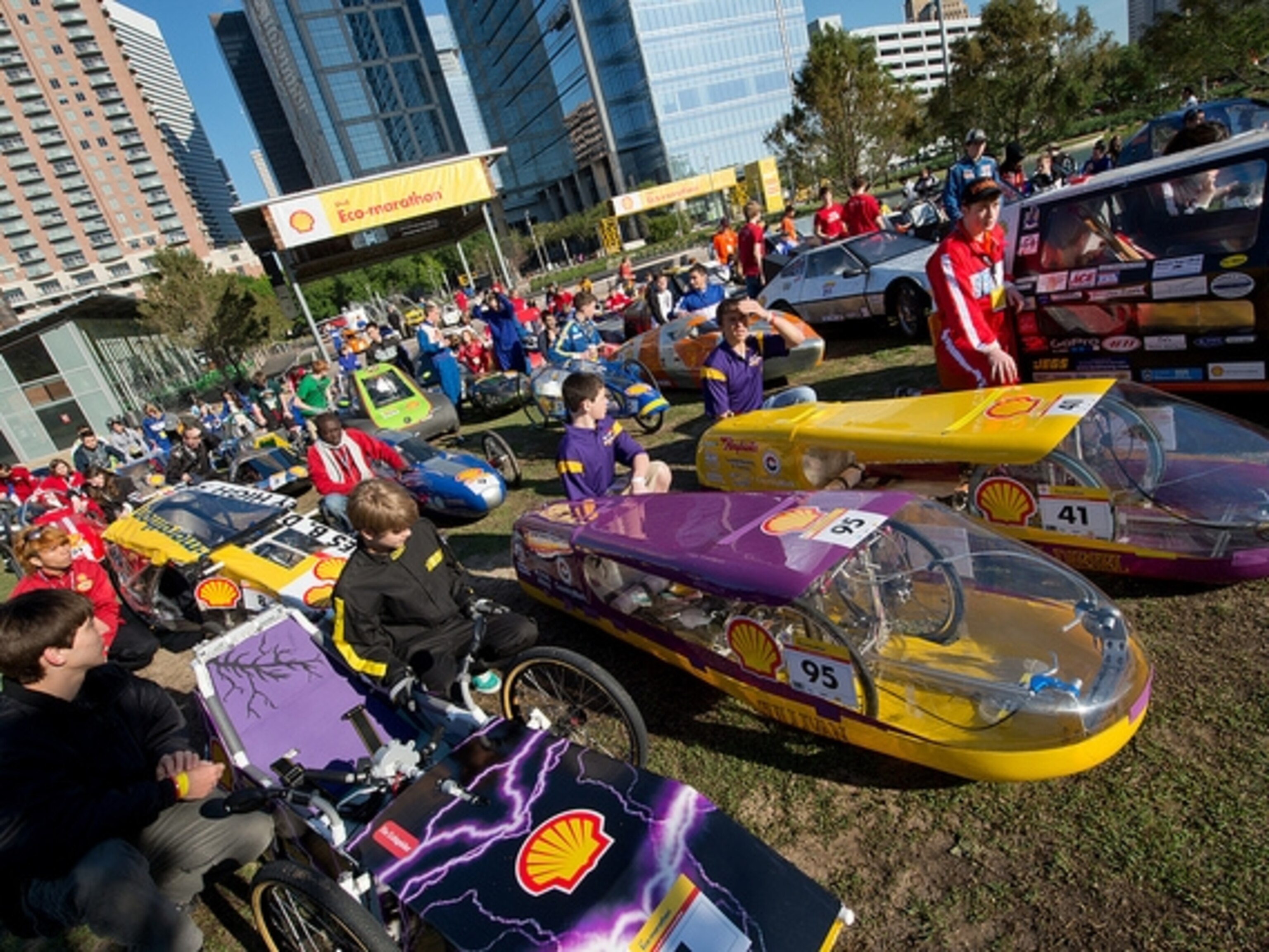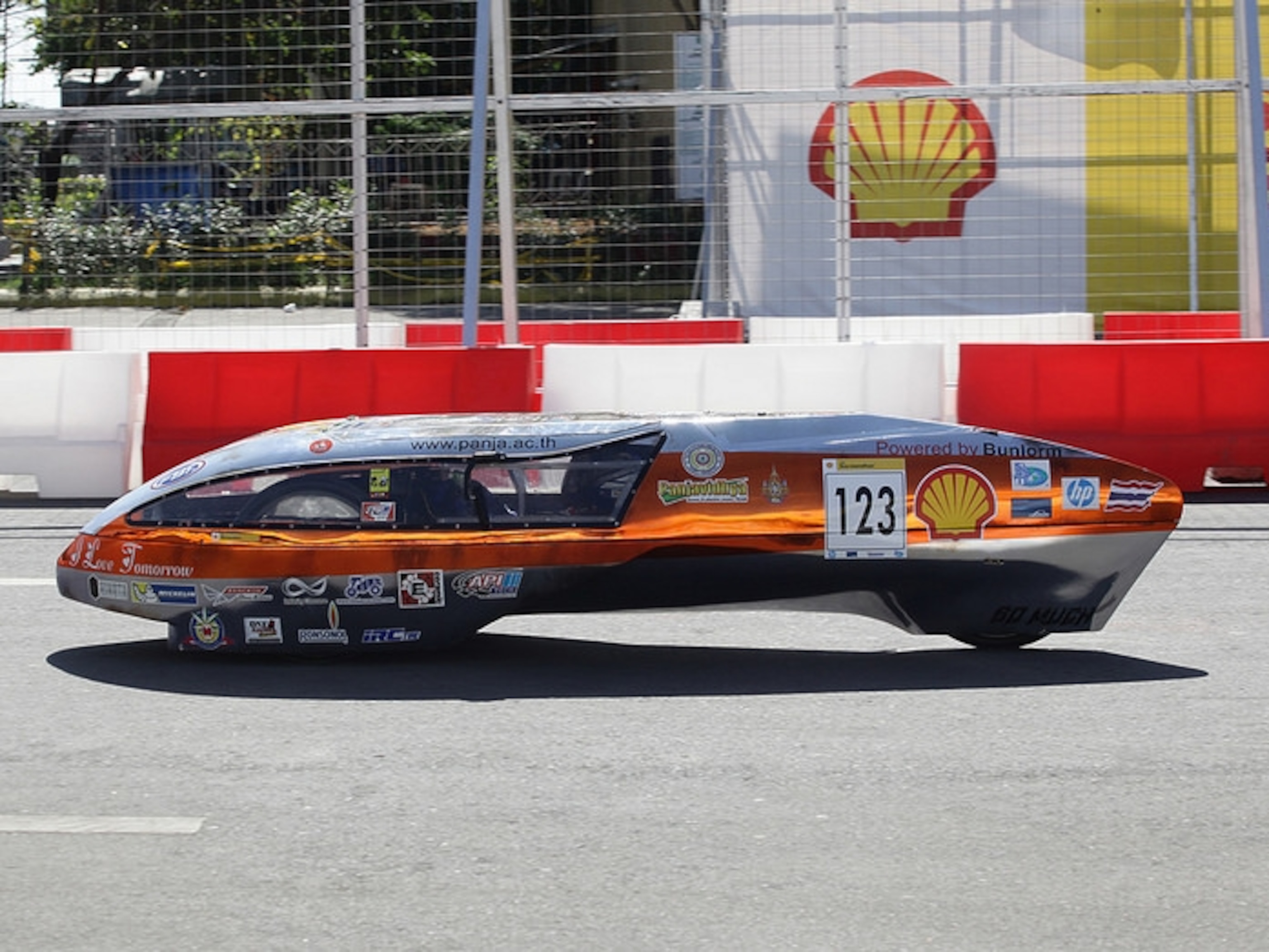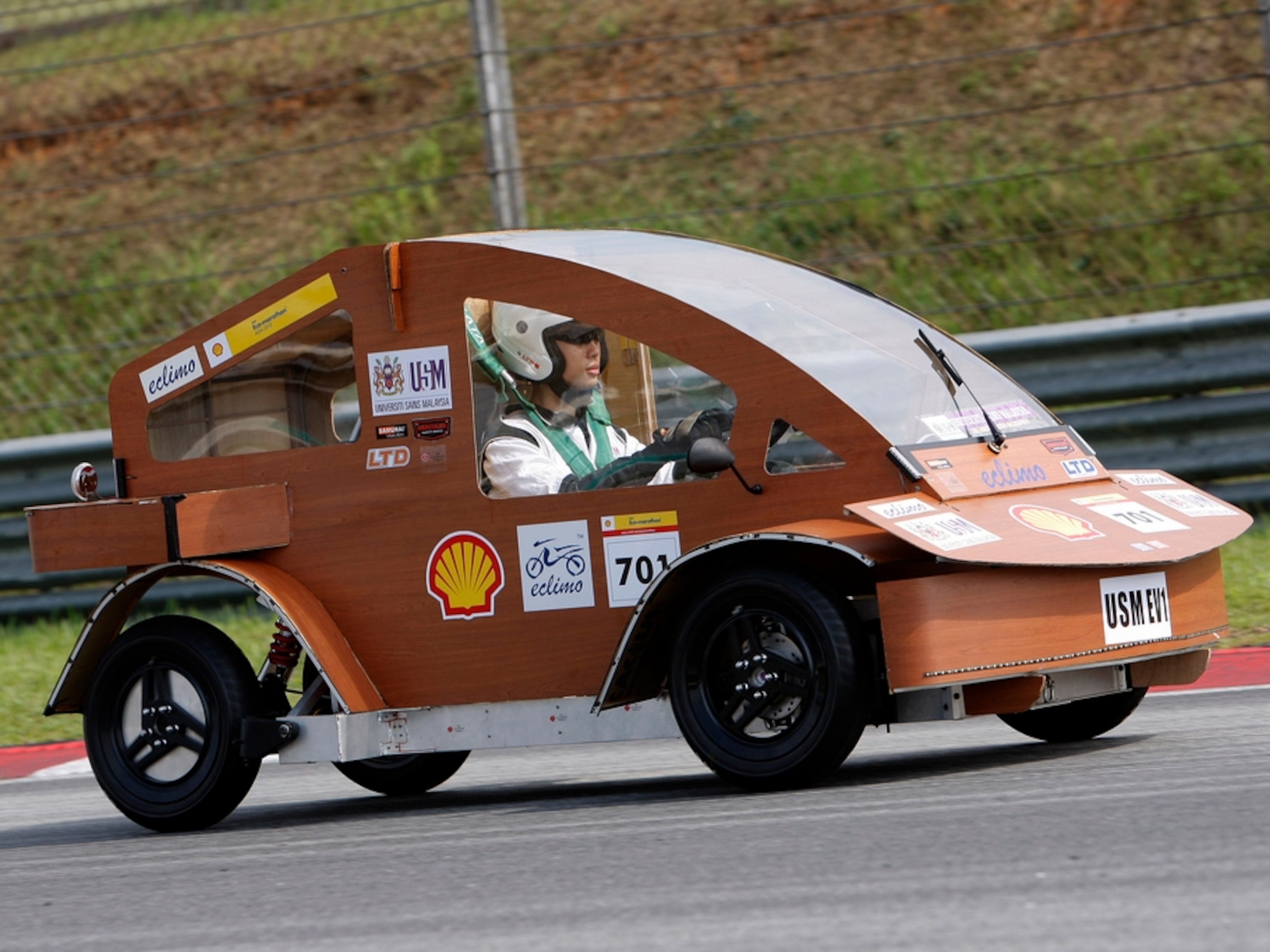
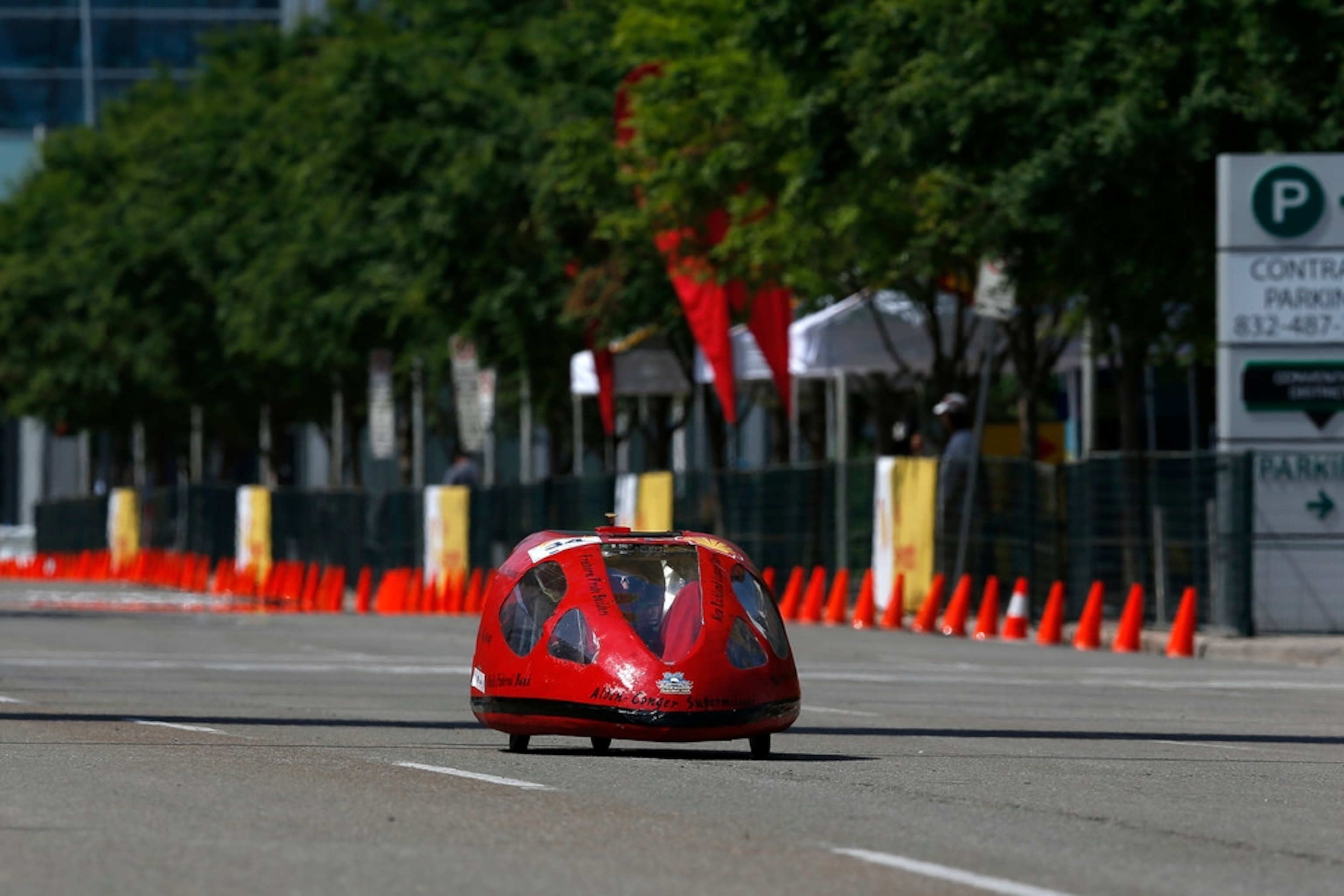
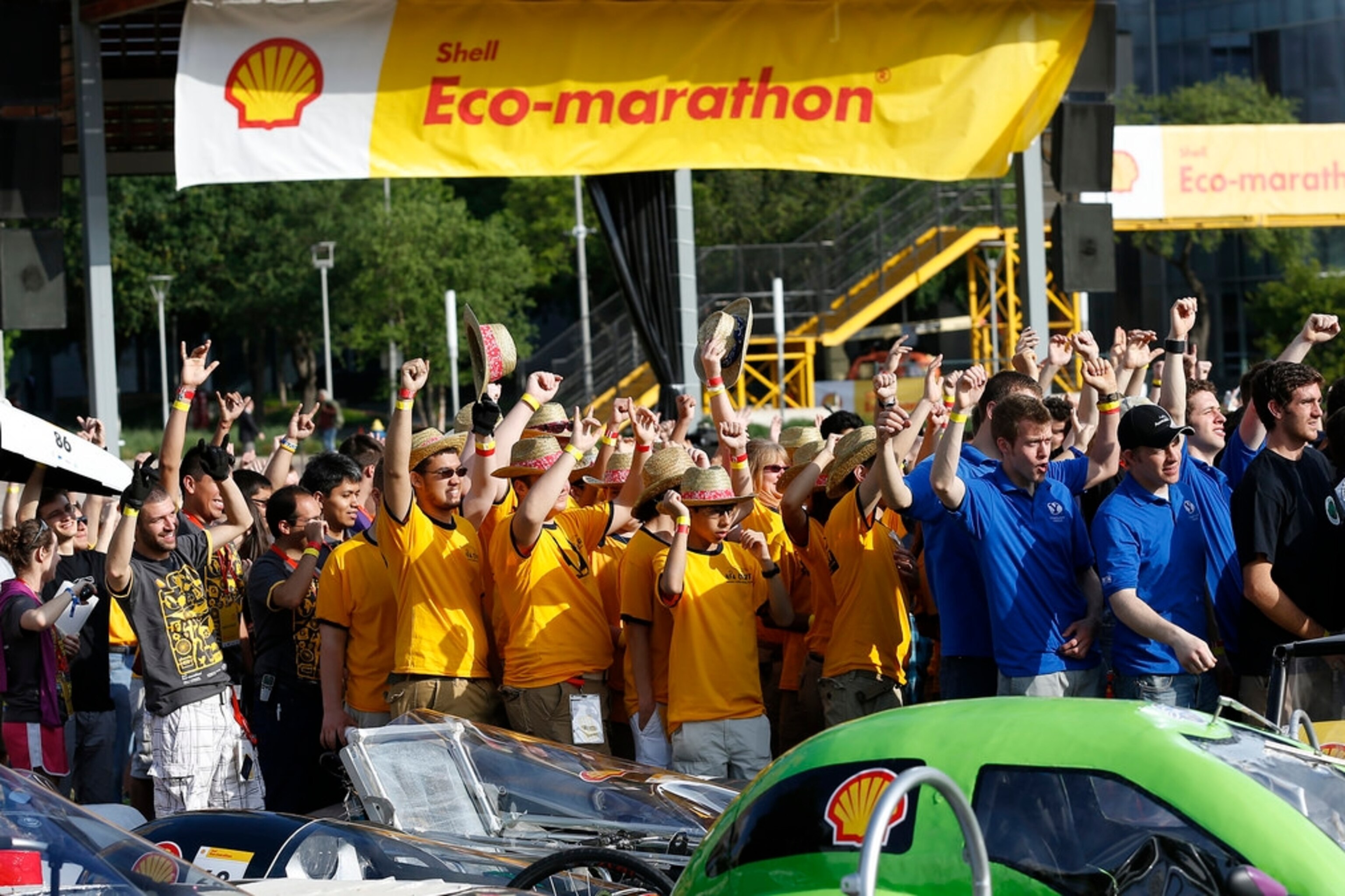
Shell Eco-marathon Americas Heats Up in Houston as Student Teams Test Prototypes
A group of cowboy hat-wearing New York teenagers is one step closer to pushing the boundaries of energy efficiency after hours of tinkering with their battery-powered prototype.
More than 1,000 high school and university students from five countries are competing this weekend in the annual Shell* Eco-marathon Americas competition in Houston.
Two student teams from Newburgh Free Academy in New York stand out of the crowd with bright yellow T-shirts and cowboy hats with red bandanas. But like other teams, their futuristic prototype must pass inspection before hitting the streets of Houston.
Drowning out the sounds of buzzing drills, clanking tools and roaring engines, senior and team leader Marley Brackett took a break from fidgeting with fuses to share his thoughts on the team’s progress.
“Stressed is a good adjective to use,” Brackett said with a smile. “Getting it on the track with a successful test run is a top goal.”
The students got a taste of the track Friday morning after pushing their colorful creations to Houston’s Discovery Green for the opening ceremony, where the 126 student teams stood in a sea of matching T-shirts.
“What you do here is fun, but it can change the trajectory of the future,” said Houston Mayor Annise Parker before waving the green flag to start the competition.
Shell Vice President of External Affairs Niel Golightly congratulated the students for their innovation, which could be seen in fuel-efficient vehicles of all shapes and sizes lining of the grass of Discovery Green.
“For anybody that’s worried about the ability of the millennial generation to really take on and solve some of the challenges we see facing society — whether it’s climate, energy or mobility – you need to be here and see this event,” he said.
The race around Houston’s downtown park officially starts Saturday, but it’s less about speed and more about distance.
Students can enter two categories – prototype or UrbanConcept – and use one of six fuel types, including internal combustion fuels or electric energy. The real test is how far the vehicles can go given a limited energy supply; last year’s winner, Universite Laval in Quebec, traveled 3,587 miles on one gallon of gas.

Fuel efficiency depends on vehicle design, driving efficiency and creativity, said Ignacio Gonzalez, general manager for Shell Eco-marathon Americas.
“It’s amazing how competitive they are in areas I wouldn’t even think about,” Gonzalez said.
A walk through the George R. Brown Convention Center — where teams keep their vehicles in paddocks — showcases of all these talents, including a working knowledge of science, technology and engineering. (Take the related quiz: “What You Don’t Know About Cars and Fuel.”)
The Newburgh Free Academy prototype vehicle has a custom shell – most shells are made of lightweight carbon fibre materials — but the inside work was designed and built by students with the help of parent chaperone.
Teacher and team adviser Frank Wolf called likened the hands-on experience of determining design and function to a game of dominos.
“Everything has to relate to every other part. Who thinks of that kind of stuff. We all take it for granted. The kids go through it step by step,” Wolf said.
Inspiring young people to pursue scientists and engineers is one of the goals of competition, and for Brackett, who will graduate this year, working on prototypes for the past three years has inspired a career in computer science. (See related photos: “Rare Look Inside Carmakers’ Drive for 55.”)

Brackett’s teammate Bryan Feigal, a 16-year-old sporting sunglasses, wants to pursue a career in industrial design. Competing in the Eco-marathon is family affair for Feigal, whose two older brothers also worked on vehicles in high school.
“It’s an amazing experience,” he said. “You get a feel for if you would like something like that – the stresses, pressures, what the rewards are at the end, if it’s worth it to you and dealing with all the things along the path.”
Student teams must pay for their own vehicles, which Gonzalez said brings out additional skill sets: fundraising and marketing projects.
Winners in both categories each win $2,000 for their school. “Off-track” awards include a people’s choice aware, eco-design award, technical innovation award and communications award, according to Shell.
“The prize is not everything,” Gonzalez said. “It’s more about the experience, the journey here and what they get from it.”
By the numbers:
— 1,000 plus students
— 126 teams and vehicles
— 36 high schools
— 48 universities
— 5 teams from Brazil
— 11 teams from Canada
— 4 teams from Mexico
— 1 team from Guatemala
— 106 teams from the United States
— 94 prototype entries
— 32 UrbanConcept entries
*Shell is sponsor of the Great Energy Challenge. National Geographic maintains autonomy over content.
You May Also Like
Go Further
Animals
- Octopuses have a lot of secrets. Can you guess 8 of them?
- Animals
- Feature
Octopuses have a lot of secrets. Can you guess 8 of them? - This biologist and her rescue dog help protect bears in the AndesThis biologist and her rescue dog help protect bears in the Andes
- An octopus invited this writer into her tank—and her secret worldAn octopus invited this writer into her tank—and her secret world
- Peace-loving bonobos are more aggressive than we thoughtPeace-loving bonobos are more aggressive than we thought
Environment
- Listen to 30 years of climate change transformed into haunting musicListen to 30 years of climate change transformed into haunting music
- This ancient society tried to stop El Niño—with child sacrificeThis ancient society tried to stop El Niño—with child sacrifice
- U.S. plans to clean its drinking water. What does that mean?U.S. plans to clean its drinking water. What does that mean?
- Food systems: supporting the triangle of food security, Video Story
- Paid Content
Food systems: supporting the triangle of food security - Will we ever solve the mystery of the Mima mounds?Will we ever solve the mystery of the Mima mounds?
History & Culture
- Strange clues in a Maya temple reveal a fiery political dramaStrange clues in a Maya temple reveal a fiery political drama
- How technology is revealing secrets in these ancient scrollsHow technology is revealing secrets in these ancient scrolls
- Pilgrimages aren’t just spiritual anymore. They’re a workout.Pilgrimages aren’t just spiritual anymore. They’re a workout.
- This ancient society tried to stop El Niño—with child sacrificeThis ancient society tried to stop El Niño—with child sacrifice
- This ancient cure was just revived in a lab. Does it work?This ancient cure was just revived in a lab. Does it work?
Science
- The unexpected health benefits of Ozempic and MounjaroThe unexpected health benefits of Ozempic and Mounjaro
- Do you have an inner monologue? Here’s what it reveals about you.Do you have an inner monologue? Here’s what it reveals about you.
- Jupiter’s volcanic moon Io has been erupting for billions of yearsJupiter’s volcanic moon Io has been erupting for billions of years
- This 80-foot-long sea monster was the killer whale of its timeThis 80-foot-long sea monster was the killer whale of its time
Travel
- How nanobreweries are shaking up Portland's beer sceneHow nanobreweries are shaking up Portland's beer scene
- How to plan an epic summer trip to a national parkHow to plan an epic summer trip to a national park
- This town is the Alps' first European Capital of CultureThis town is the Alps' first European Capital of Culture
- This royal city lies in the shadow of Kuala LumpurThis royal city lies in the shadow of Kuala Lumpur
